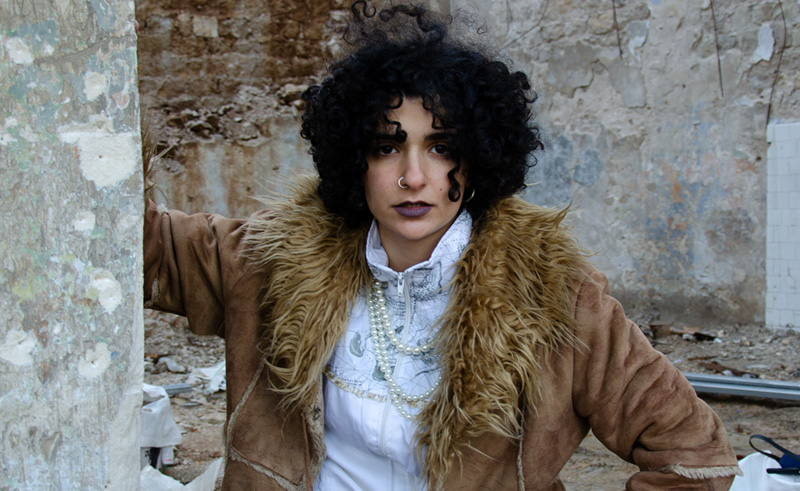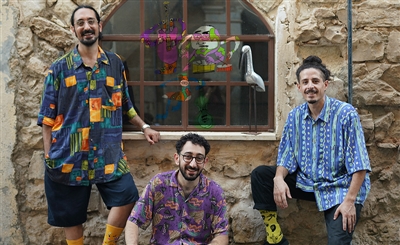Rasha Nahas’s Album ‘Amrat’, a Journey Back to Her Palestinian Roots
Released on UK label Cooking Vinyl, the electro-acoustic album features collaborations with Dina El Wedidi, Rami Nakhlee, Rimon Haddad and Terez Sliman.

In her first Arabic language album, Rasha Nahas’s raw vocal and stunning guitar lines cut through a sonic world otherwise driven by auto-tune, AI, and beats. Instead, in ‘Amrat’ (meaning “Sometimes” in Arabic), we remember rock and roll and what it means to sing your way across continents of distance just to gain any assemblage of home. The album is a follow-up to her 2021 debut, ‘Desert’, driven by “theatrical, poetic rock” ballades and an attempt to “navigate the gulf between the theatrical and the personal, between metaphor and raw storytelling.”
While ‘Deserts’ was driven at times by a bigger band sound, one that was largely recorded with many of the musicians in the same room, ‘Amrat’ feels more minimalistic, albeit without falling flat or becoming predictable.
“Rasha Nahas says: “The album traverses the boundaries between East and West, but there are also spaces in-between. Those “third spaces” have an element of freedom, and these all flow throughout the melodies and narrative of “Amrat.”
After writing the album in Berlin, Nahas recorded ‘Amrat’ with co-producer Shaden Nahra at the newly established 67 Studio in the Occupied Golan Heights. Along the way, Nahas collaborated with some of Palestine’s leading musicians from the indie scene, where we find contributions from drummer Rami Nakhlee (of TootArd), pioneer composer and multi-instrumentalist Rimon Haddad and singer-songwriter Terez Sliman. The album was almost entirely written and composed by Nahas, with the exception of ‘Toyour’, co-written and co-composed by Egypt’s cross-genre star, while the lyrics for ‘Riyah Jnoob’ were written alongside Terez Sliman.
‘Amrat’ is structured as “two distinctive chapters of music, the album conjures a sonic backdrop that is fluid yet clearly defined,” as described in the liner notes on Bandcamp. The first chapter is driven by melancholy and feelings of alienation, written during the pandemic while Nahas was recovering from a hand injury. The limitation forced her to experiment with other instruments, chiefly electronics and looped synth lines and pads. In the second chapter, the six songs are tied together by a longing for home - with her guitar in hand again, Nahas’ knack for songwriting shines through each track.
Disc 1 opens up with an atmospheric intro that immediately displaces us as we enter into what sounds like an ambient recording of an airport, with background chatter and soaring aeroplanes that eventually deconstruct into silence. The title track, ‘Amrat’ arrives by means of a sweet synth line and gentle chord progression as Nahas’ voice lands in the city of Haifa, Palestine, where she sings of reclaiming a city through the lens of Palestinian pop artist Basham Murad who directed the music video. Filmed in Wadi Salib, one of Haifa’s historic neighbourhoods, from which residents were systematically displaced, the camera pans across shorts of the city, where we eventually meet the sea at the song’s more serene moments.
In ‘Habbetek’, we enter into a romantic song full of double entendres, a languid bassline and beautiful lines that sing of a love that came out from “beneath the earth” only to travel “above the clouds.” With lovely synth lines that interlace around the bass and a gentle melody to give the song the space it needs to announce that this is an album driven by the momentous force that is the human voice. Across the 12-tracks, each line penned is presented with the courage of what it means to sing through minimal vocal processing in a world driven by chipmunk vocal aesthetics and autotune.
Instead, we hear Nahas's voice clear and present throughout the album. Even in tracks like ‘Khotwi’, the reverb and layers of vocal harmonies make use of some effects, but her lyrics and singing continue to arrive with clarity and momentum. Even when things slow back down, as heard in ‘Ryah Jnoon’, with lyrics co-written by Terez Sliman, Nahas’ voice carries us through each track like a flashlight shining in an otherwise dark room.
As Disc 1 closes with ‘Fi’, and with the acoustic guitar, arpeggio plucked strings, and seaside ambient noise that drifts in and out of the track’s soundscape, announcing what feels like a metaphorical shift in location, a return to nature. Disc 2 opens up with ‘Ya Binti’, where Nahas’ gentle guitar lines are met with Arabic polyrhythms played out on hand drums, and lines that sing,
“There’s a shiver in your voice my girl
The Sound of an echo
Sitting there
Without anyone
Without anything”
One of the most notable aspects of Nahas’s musicality arrives through her dexterity on the guitar. We hear this in contrast between one song to the next, where in ‘Nbeed’ she plays through what sounds almost reminiscent of a classical Spanish style, which then bleeds brilliantly into the next track, ‘Toyour.’ Co-written and co-composed by Dina El Wedidi, ‘Toyour’ (meaning Birds) is a prime example of the magic that can be made when two artists have enough musical chemistry to produce a song that mirrors the pain of longing and distance, reinforced through clever production techniques that reinforce the themes.
“Recorded between the Golan Heights, Cairo, and Berlin,” the track grapples with “topics of separation and distance,” and we hear this when El Wedidi’s familiar voice descends up on the track from what sounds like a far-off place, like a bird riding the wind to send a message that sings,
“The colour of the skies in my river
The whole world swims in clouds
Birds are born for the horizon
Playing on the edges
Of the universe..”
Check out the link below to listen to Rasha Nahas's 'Amrat'.
- Previous Article test list 1 noise 2024-03-13
- Next Article Adriatique & Cercle Host Electronic Music Event at Hatshepsut Temple






















